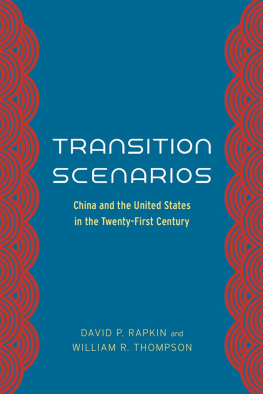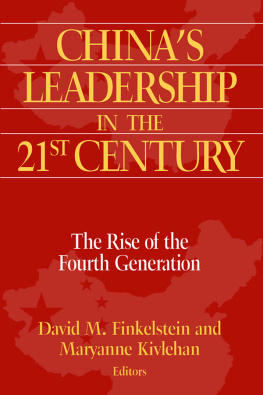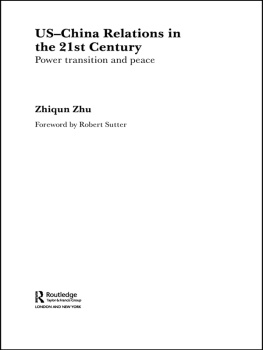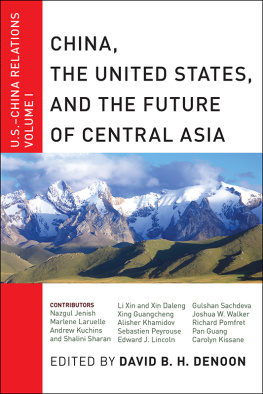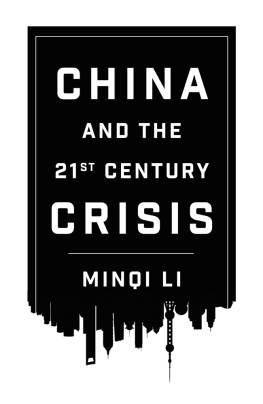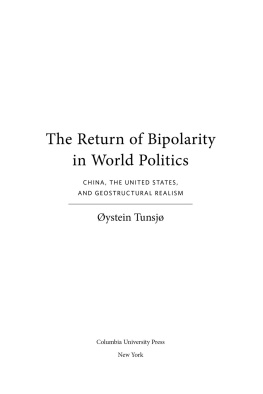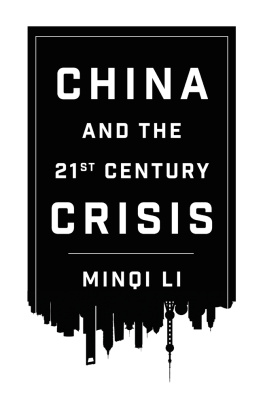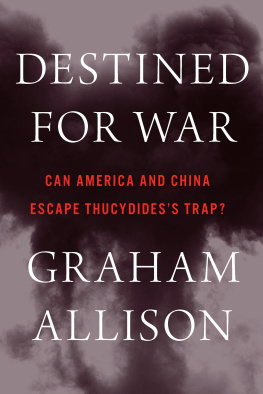DAVID P. RAPKIN is associate professor of political science at the University of Nebraska.
WILLIAM R. THOMPSON is Distinguished Professor and the Donald A. Rogers Professor of Political Science at Indiana University. He is the author or coauthor of numerous books, including The Arc of War, also published by the University of Chicago Press.
The University of Chicago Press, Chicago 60637
The University of Chicago Press, Ltd., London
2013 by The University of Chicago
All rights reserved. Published 2013.
Printed in the United States of America
22 21 20 19 18 17 16 15 14 13 1 2 3 4 5
ISBN-13: 9780-226040332 (cloth)
ISBN-13: 9780-226040479 (paper)
ISBN-13: 9780-226040509 (e-book)
Library of Congress Cataloging-in-Publication Data
Rapkin, David P., author.
Transition scenarios : China and the United States in the twenty-first century / David P. Rapkin and William R. Thompson.
pages cm
Includes bibliographical references and index.
ISBN 978-0-226-04033-2 (cloth : alkaline paper) ISBN 978-0-226-04047-9 (paperback : alkaline paper) ISBN 978-0-226-04050-9 (e-book)
1. United StatesRelationsChina. 2. ChinaRelationsUnited States. 3. WarForecasting. I. Thompson, William R., author. II. Title.
E183.8.C5R37 2013
327.7305109'05dc23
2013003714

This paper meets the requirements of ANSI/NISO Z39.481992 (Permanence of Paper).
Acknowledgments
We thank our two anonymous reviewers for their helpful comments, our editor, David Pervin, for picking them, and Elissa Park, for her excellent copyediting. As usual, it is a pleasure to work with all of the folks at University of Chicago Press. Part of is based on David P. Rapkin and William R. Thompson, Kantian Dynamics and Systemic Transitions: Can International Organizations Influence U.S.-China Conflict?, in William R. Thompson, ed., Systemic Transitions: Past, Present, and Future (New York: Palgrave-Macmillan, 2008). We are grateful to Taylor and Francis, the National Bureau of Asian Research, and Palgrave-Macmillan, respectively, for permission to use this material.
CHAPTER ONE
Twenty-First-Century Transition Struggles
In March 1996 China engaged in military exercises in the Taiwan Straits, including the firing of missiles to offshore sites near Taiwanese ports, with the obvious intent of intimidating voters during the lead-up to Taiwans national elections. The United States responded by sending two carrier groups to the area in a show of force that proved effective in so far as Chinas military exercises stopped, the carrier groups exited the area, and the crisis was resolvedthough the underlying issues concerning the status of Taiwan, Chinas use of force, and the role of the United States were not. A little more than three years later, in May 1999, in the course of NATOs war against Yugoslavia, US planes bombed the Chinese embassy in Belgrade, killing three Chinese diplomatic personnel. The Chinese government, as well as most Chinese, dismissed as implausible the US explanation that the bombing had been an accident stemming from the use of an outdated map and rejected the US apology premised on this account. With their governments approval, large crowds of outraged Chinese demonstrators demonstrated their antagonism by stoning the US embassy in Beijing. The prospect of armed conflict between the United States and China loomed even larger in April 2001 when the pilot of a Chinese fighter aircraft was killed near Chinas territorial waters in a collision with a US EP3 surveillance aircraft. The EP3 then made an emergency landing at a Chinese airbase on Hainan Island, triggering a crisis over release of the crew and return of the aircraft and its sensitive surveillance equipment.
Some fourteen years later (2009), the USNS Impeccable, a small ship with a crew of about fifty and designed to detect and track submarines, experienced several days of Chinese harassment about seventy-five miles south of Chinas Yulin Naval Base on Hainan, an island in the South China Sea. Presumably, the US mission was to monitor new classes of nuclear submarines based at Yulin. The first day a Chinese frigate crossed the Impeccables bow twice while Chinese aircraft flew over the ship repeatedly. Two days later, another Chinese naval vessel demanded that the Impeccable leave the area. The next day, a small flotilla of Chinese ships began harassing the Impeccable, again demanded that it leave the area, and eventually two of the ships came quite close to the American vessel. The Impeccable responded by spraying water on the closest ship. Ultimately, the Impeccable did leave the area but the Chinese flotilla continued to harass it with dangerous maneuvers as it was leaving, including an attempt to capture its towed sonar array.
The US government protested and also sent a destroyer to escort the Impeccable. In some respects, the issue revolved around maritime rights of passage. The United States claimed its ship was operating outside Chinese territorial waters and could not be hindered. The Chinese government retorted that foreign military ships could sail through their exclusive economic zone (up to two hundred miles from Hainan), but only if their passage was for innocent purposesa description that did not apply to the Impeccable. More generally, though, the problem was one of adversarial frictions over intelligence gathering reminiscent of US-Soviet naval maneuvering during the Cold War.
In light of this not-too-distant series of militarized disputes, it is possible to imagine how a US-China war could begin as a quickly escalating clash at sea or somewhere in Eurasia (i.e., between Taiwan and Serbia). Beneath the flow of events that might serve as proximate causes of such a war, however, we believe there are deeper structural changes underway that will affect more fundamentally the prospects for US-China conflict in the twenty-first century. By structural change we mean long-term change in the distribution of power at the apex of the global system, that is, a power transition in which an emerging challenger draws closer to, and may eventually surpass, the existing system leader in terms of those specific power capabilities relevant to the form and maintenance of global order. Though they need not culminate in war, power transitions tend to be particularly dangerous periods, especially if the challenger is dissatisfied with the existing order and the economic benefits, security, and status it is accorded within it.
If the rates of economic growth and military modernization that China has achieved over the last twenty years or so are extrapolated into the future, not too many more decades will pass before China is able to mount a significant challenge to the predominant position of the United States, at least in East Asia and perhaps globally. There is fairly wide agreement that some form of US-China power transition looms later in this century, but a number of questions remain. When will the power transition enter the most dangerous, war-prone phase? Will China become so disgruntled with the prevailing regional and/or global order that it will risk war in order to change the way things work? How can (and should) Chinas interests be accommodated within the existing order so as to minimize this risk?
We view these questions as open-ended, which is to say that we do not know the answers. But there are several possibilities. China could be integrated into the world economy peacefully. China might well become so dissatisfied with the worlds status quo that it would risk open warfare to alter it more to its liking. But future outcomes are not predicated solely on how Chinese decision-makers view the world and their status within it. The current status quo structure was constructed primarily by the United States after World War II. Will the United States continue to weaken, thereby encouraging a transitional supplantment effort? Might the United States revive its faltering lead economy and make the twenty-first century an American one as it did in the previous century? We have no crystal ball to answer these questions. What we do have is history, international relations theory, and some new ways of looking at transition struggles. Turning first briefly to the history of past transition competitions, it is clear that pacific adjustments to these fundamental changes in relative status at the apex of elite states have not been the rule. That does not mean that things have to work out in the future precisely as they have in the past but we do need to start with a clear understanding of how transitions have unfolded in the past. Then we can turn to crafting an approach to examining possible future transitions in a systematic and transparent fashion.
 This paper meets the requirements of ANSI/NISO Z39.481992 (Permanence of Paper).
This paper meets the requirements of ANSI/NISO Z39.481992 (Permanence of Paper).
